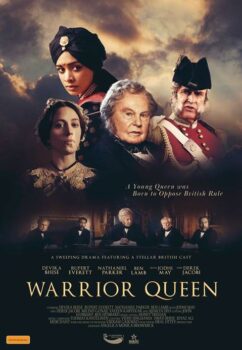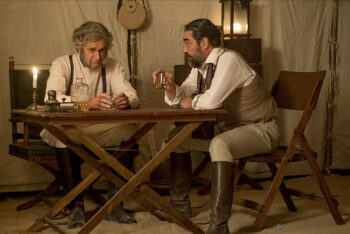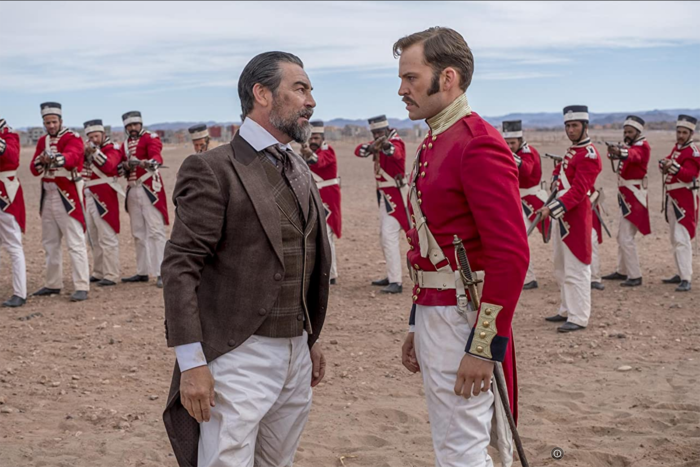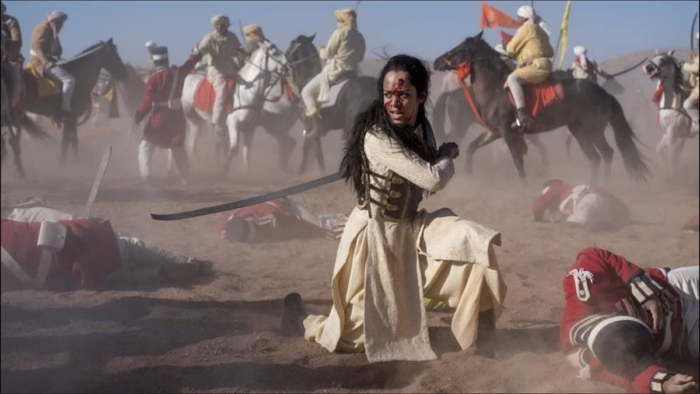Film Review: Warrior Queen Directed by Swati Bhise
Warrior Queen director Swati Bhise‘s vision over-reaches her budget in this heartfelt biopic of the legendary Rani Lakshmibai, who led an uprising against the notorious East India Company.
 Lakshmi (Devikha Bhise), a commoner, was the only child of an adoring father, who taught her horsemanship, archery and how to wield a sword. She married the Maharaja of the independent Jhansi Province when she was fifteen, a loving relationship though he was significantly older.
Lakshmi (Devikha Bhise), a commoner, was the only child of an adoring father, who taught her horsemanship, archery and how to wield a sword. She married the Maharaja of the independent Jhansi Province when she was fifteen, a loving relationship though he was significantly older.
In 1853, she gave birth to a son, who died soon after. To maintain succession to the throne, they adopted the Mararaja’s nephew. The Maharaja died a few days later and the British refused to recognise the adopted child as the rightful heir and decided to annex Jhansi.
Rani Lakshmi took power, resisting the counsel of her male advisers. Where Jhansi had supported the British in previous uprisings, she gathered armies to battle them and the East India Company, ultimately leading to the dissolution of the company.
Warrior Queen is one of those movies I really wanted to love – the little known story of a true-life Indian Queen, a fierce general and feminist icon. She defied tradition, rallied her people and raised armies.
But what we have here falls short in so many areas. The biggest problem is the lack of budget. Director Swati Bhise envisioned this film as a sweeping epic, with armies facing off on a vast plain. We have the vast plain, but no armies – lots of empty space and a few soldiers. No money to CGI an army or to pay extras – so we are somehow expected to presume the might of the British army as a line of soldiers march two by two across the desert.
The script inexplicably wanders back and forth between Hindi and English. Yes upper class, educated Indians would certainly be able to speak English, but to each other? One sentence English the next Hindi? But regardless of language spoken, there is a dire lack of sharp dialogue, but plenty of bland pronouncements.
The director’s daughter, the American actress Devika Bhise was an unfortunate bit of casting as Rani. She simply lacks the physical presence and charisma to carry off the role. It’s not that she’s a bad actress, but being miscast and not much to work with script-wise did her no favours.
However, Rani’s fight scenes are quite impressive. I was wondering if it was a male or female stuntperson slicing up the Brits a la Tarantino‘s Bride in Kill Bill, when the enemy general, Sir Hugh Rose (Rupert Everett) watching through his spyglass, declares, “She’s like Joan of Arc!” The real Warrior Queen may well have invited that comparison, but not this one.
 The upsides – Rupert Everett as the British General Rose (with an outrageous set of sideburns!) trying to balance Rani’s lovestruck British adviser Robert Ellis (Ben Lamb) and the cartoonish Nathaniel Parker as the East India Company boss Sir Robert Hamilton who plays every imperialist stereotype with aplomb.
The upsides – Rupert Everett as the British General Rose (with an outrageous set of sideburns!) trying to balance Rani’s lovestruck British adviser Robert Ellis (Ben Lamb) and the cartoonish Nathaniel Parker as the East India Company boss Sir Robert Hamilton who plays every imperialist stereotype with aplomb.
Meanwhile back in the old country, Queen Victoria (Jodhi May) wrestles with her prime minister, Lord Palmerston (Derek Jacobi.)
The best parts of the film are the scenes where Rani steps away from her role as queen, when she is at ease with her woman friends. And when she and Robert Ellis struggle with their forbidden attraction.
The costumes and interior sets are exquisite, full of detail – jewellery, silks, dancing, music. You can smell the incense.
Should you go see it? Not if you’re looking for a sweeping historical drama. It’s a bit too violent to be a chick flick, and a bit too feminist to be an actioner. But if you’re curious about one of the most heroic, overlooked women in history, this might just be your cuppa.
Veronica McLaughlin

